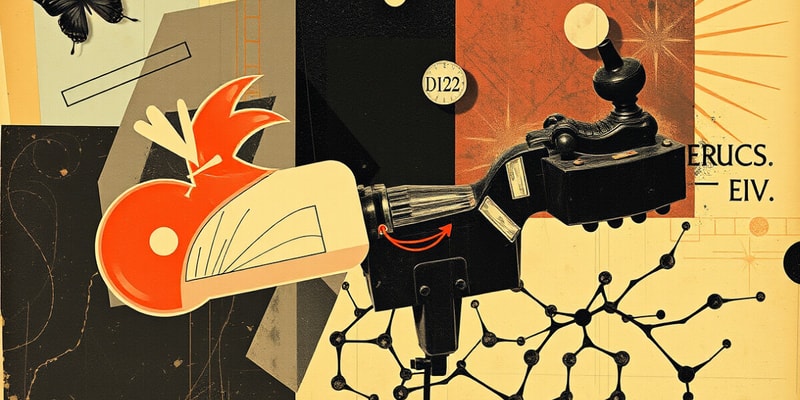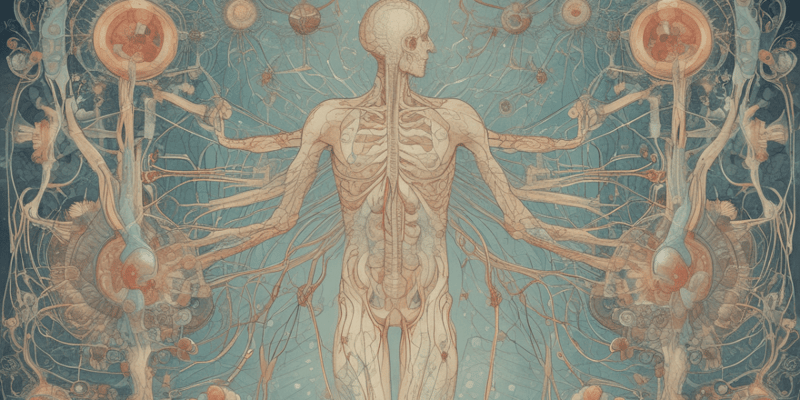Questions and Answers
Which of the following best describes the primary effect of muscarinic agonists on the heart?
What physiological change occurs in the exocrine glands as a result of muscarinic agonist activation?
What is a direct effect of muscarinic activation in the bladder?
Which effect is associated with muscarinic agonists in the eyes?
Signup and view all the answers
Cholinesterase inhibitors have what effect on acetylcholine levels in the synaptic cleft?
Signup and view all the answers
Which of the following is a prototype muscarinic agonist drug?
Signup and view all the answers
What cardiovascular responses are observed in patients with hyperthyroidism when administered bethanechol?
Signup and view all the answers
What is the primary nervous system response stimulated by muscarinic agonists?
Signup and view all the answers
What is one of the major effects of norepinephrine release?
Signup and view all the answers
Which condition contraindicates the use of Bethanechol?
Signup and view all the answers
What is a primary treatment for muscarinic (cholinergic) toxicity?
Signup and view all the answers
What does the mnemonic DUMBELS stand for in the context of cholinergic toxicity?
Signup and view all the answers
Which class of drugs prevents the degradation of acetylcholine?
Signup and view all the answers
What symptom is NOT typically associated with muscarinic poisoning?
Signup and view all the answers
Which drug is commonly used for the management of Myasthenia Gravis?
Signup and view all the answers
What is the primary action of cholinesterase inhibitors?
Signup and view all the answers
Which symptom is indicative of cholinergic toxicity according to the mnemonic SLUDGE?
Signup and view all the answers
Which of the following is a potential hazard of using high doses of Pyridostigmine?
Signup and view all the answers
Study Notes
Cholinergic Drugs Overview
- Influence cholinergic receptors by mimicking or blocking acetylcholine actions.
- Two main types: Muscarinic agonists and Cholinesterase inhibitors.
Muscarinic Agonists (Parasympathomimetics)
- Mimic acetylcholine, activating muscarinic receptors, leading to a parasympathetic response.
- Key target structures include the heart, exocrine glands, smooth muscles, and eyes.
Cardiac Effects
- Cause bradycardia: decreased heart rate due to muscarinic agonism.
Exocrine Glands
- Increase sweating, salivation, bronchial secretions, and gastric acid secretion.
Smooth Muscle Effects
- Promote contraction in lung and gastrointestinal (GI) tract smooth muscles.
- Result in bronchi constriction and increased GI muscle tone/motility.
Bladder Function
- Detrusor muscle contraction and relaxation of trigone and sphincter result in bladder emptying.
Vascular Smooth Muscle
- Muscarinic activation leads to relaxation and vasodilation, potentially causing hypotension.
Ocular Effects
- Activation causes miosis (pupillary constriction) and ciliary muscle contraction for near vision accommodation.
Cholinesterase Inhibitors (Anticholinesterase)
- Prevent breakdown of acetylcholine, increasing available acetylcholine for receptor activation.
- Responses are akin to parasympathetic stimulation.
Prototype Drugs
- Muscarinic Agonist: Bethanechol (Urecholine).
- Cholinesterase Inhibitor: Pyridostigmine (Mestinon).
Safety Considerations for Bethanechol Prescribers
- In hyperthyroidism, initial responses may include bradycardia and hypotension, but norepinephrine release can lead to dysrhythmias.
Contraindications for Bethanechol
- Contraindicated in patients with active or latent asthma due to potential bronchoconstriction.
Muscarinic (Cholinergic) Toxicity
- Induced by muscarinic agonists or cholinesterase inhibitors.
- Symptoms include: DUMBELS (Diaphoresis, Urination, Miosis, Bradycardia, Emesis, Lacrimation, Salivation) and SLUDGE (Salivation, Lacrimation, Urination, Diarrhea, GI cramping, Emesis, Bradycardia).
- May also occur from certain mushroom ingestion (Inocybe, Clitocybe spp.).
Treatment for Muscarinic Toxicity
- Administer atropine to reverse most toxicity signs and provide supportive care.
Treatment for Myasthenia Gravis
- Medications: Pyridostigmine (Mestinon).
- Mechanism: Inhibits cholinesterase, increasing acetylcholine availability for receptor activation.
- Typical dosing: 600 mg/day divided into multiple doses; adjustments based on patient response.
- Precautions: Avoid abrupt dose discontinuation, especially in stabilized patients.
Cholinesterase Inhibitors Overview
- Prevent degradation of acetylcholine, enhancing cholinergic action.
- Indications: Myasthenia Gravis, glaucoma, Alzheimer’s, Parkinson’s, treatment of muscarinic antagonist poisoning, and reversal of neuromuscular blockade.
- Categories: Reversible (moderate duration) and Irreversible (long duration).
Studying That Suits You
Use AI to generate personalized quizzes and flashcards to suit your learning preferences.
Description
This quiz covers the influence of cholinergic drugs on receptors, focusing on muscarinic agonists. It discusses their mimicking action on acetylcholine and the principal structures affected, such as the heart and exocrine glands. Test your knowledge on the types and effects of these drugs.



